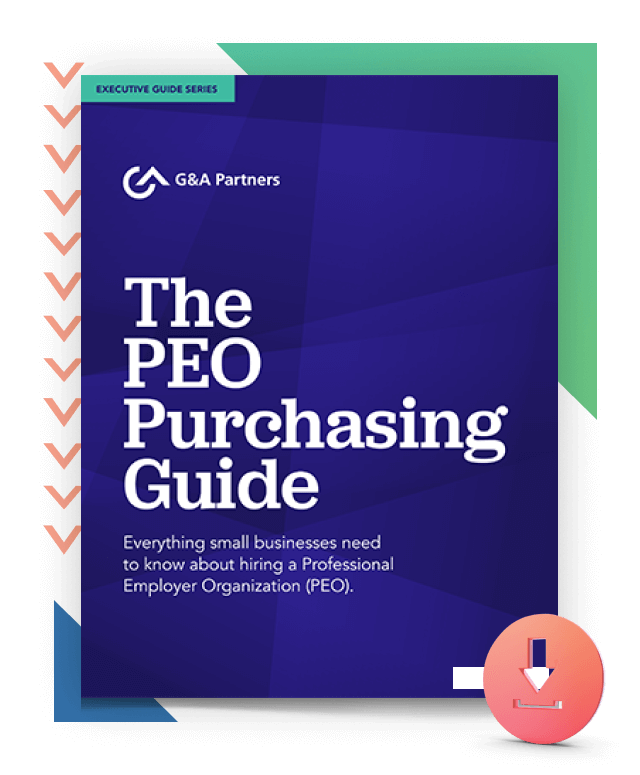
- Payroll processing
- Payroll taxes
- Employee benefits administration
- Workers’ compensation and claims management
- Compliance assistance
- HR technology
Sign up to receive newsletters, webinars, resources, and exclusive updates straight to your inbox.
As your business grows, so do your human resource responsibilities. And while growth and expansion can be exciting, the effort needed to keep up with additional HR administration tasks can quickly start to monopolize your time—taking you away from revenue-generating activities. Fortunately, outsourcing your HR is an option, and working with a PEO is one of the most effective outsourcing solutions for small and mid-sized businesses.
What does PEO stand for? A PEO, or professional employer organization, provides a full-service solution for businesses that are looking to offload their HR administrative functions, such as payroll processing, payroll taxes, employee benefits administration, and more.
PEOs like G&A Partners provide HR administration support for your business through a structure called co-employment.
In this arrangement, the PEO becomes the employer of record for your business, which means you share liability with the PEO on employee-related matters. In this agreement, you retain full control of the day-to-day operations, business decisions, and employee management while the PEO handles back-office administrative tasks on your behalf.
PEOs manage a range of payroll-related tasks, including:
Employee-related taxes are processed under the PEO’s federal tax identification number.
Partnering with a PEO often gives you access to high-quality, affordable benefits, including group health insurance, ancillary options such as dental, vision, and life insurance, 401(k), accident and disability, and more.
A PEO can also help:
Some PEOs, like G&A, have HR experts dedicated to providing services and support, such as:
PEOs generally have compliance experts available to help you understand federal, state, and local laws and regulations that may impact your business, including the Fair Labor Standards Act (FLSA), paid leave, the Affordable Care Act (ACA), and more.
PEOs can provide a variety of risk management services and support, including:
Some PEOs, including G&A, offer recruitment services to help you:
A PEO may offer:

A PEO can be a valuable partner for a small or mid-sized business. Saving time and offloading day-to-day HR administration are significant advantages, but that’s just the beginning.
Below are some additional scenarios where a PEO can help:
1. You’d like to offer your employees access to Fortune 500-level benefits at affordable prices.
At G&A Partners, we are co-employers for thousands of worksite employees, giving us the kind of collective buying power usually reserved for large corporations. When we (or other PEOs) negotiate rates for medical insurance and other benefits, we’re able to leverage that purchasing power to secure better rates and higher-quality plans. And the ability to offer your employees a comprehensive and competitive benefits package can help you attract and retain top talent.
2. You want to maintain HR compliance as your business grows and the labor laws and regulations change.
Ever-changing workplace regulations are challenging to navigate. A PEO’s HR experts can provide guidance on laws and regulations that may impact you based on your business structure, industry, and location. This can help you avoid noncompliance, which can result in costly penalties, fines, and lawsuits. And if you operate in multiple states, a PEO can help you navigate compliance across states with different overarching requirements.
3. You want to optimize your recruitment efforts and act proactively to retain valued employees.
When you find a promising employee, you don’t want to lose them to a larger organization that can offer better pay, comprehensive benefits, and a retirement plan. PEOs can improve your ability to recruit and retain employees through comprehensive recruitment services and with strategic guidance on how to improve retention and employee engagement. In fact, a 2019 study, the National Association of Professional Employer Organizations (NAPEO) found that turnover is nearly 20% lower for companies that use a PEO.
PEOs are able to provide many of their benefits to companies because of a co-employment agreement. In this type of agreement, your company and the PEO share employer responsibilities, and employees are employed by both your company and the PEO.
For some business owners, the word “co-employment” can be, well, confusing. However, the co-employment arrangement is primarily a vehicle that allows PEOs to put economies of scale to work in your favor through more affordable benefits offerings. The PEO acts as the employer of record for your business, facilitating shared liability on employee-related matters.
“A major misconception amongst some business owners is that their employees won’t know who to take direction from because the PEO’s name is on their paycheck, but that couldn’t be further from the truth,” says John G. Allen, G&A Partners’ chief revenue officer. “Employees are loyal to the companies that hire them. Studies have shown that companies that partner with a PEO often have employees with greater trust and confidence in their leadership.”
So how does a PEO partnership with a business work?
Typically, employees notice very few changes when their company transitions to a co-employment relationship. For example, the PEO’s name may appear on their paycheck, they may receive their W-2 from the PEO, and the PEO may handle benefits enrollment.
But because you’re partnering with a PEO, employees experience several advantages. You may begin offering a more comprehensive benefits package (including life insurance and retirement plans), employees may have lower benefits costs, and workers may have access to better technology that streamlines common tasks such as onboarding, clocking in, or requesting time off.
What a PEO won’t do for your employees or company is set schedules or pay rates, make decisions about your business independently, or assist with sales or marketing. While PEOs make recommendations, it’s the company’s responsibility to determine if it’s appropriate for your business, how to implement those recommendations, and how you’ll enforce them.
PEOs offer different models, and service options can vary. Some PEOs try to commoditize tactical services, while others—such as G&A Partners—deliver strategic services that are both high-tech and high-touch.
Here are commonly offered PEO models:
With this PEO model, a company enters into the co-employment agreement and engages in a full-service program, taking full advantage of all that the professional employer organization has to offer. Though this model can work for most small and mid-sized businesses, it’s ideal for dynamic, faster-growth businesses that are seeking more strategic, comprehensive HR services to support growth objectives.
This model provides an a la carte approach that lets businesses select only the specific services they require, such as payroll and benefits administration. It’s ideal for steady, slow-growth businesses that may already have existing arrangements they want to retain (such as workers’ compensation or a preferred insurance broker).
When researching PEO options, it’s important to understand the scope of service offerings for each, along with your business needs and goals. This will help you to determine which PEO can help you achieve those goals and greater operating efficiencies. It’s also important to verify that they are accredited or carry a Certified Professional Employer Organization (CPEO) certification through the IRS.
At G&A, our commitment to best-in-class customer service sets us apart from our competitors—and we have the client service ratings to back it up. We believe in delivering world-class HR solutions that help build thriving businesses, and we’re committed to making a difference in the lives of you and your employees.
When you engage with a trusted PEO like G&A, you gain a valuable HR partner that helps you handle administrative HR functions and offers strategic guidance. We help you elevate the experience you provide employees, from recruitment to onboarding to retirement.
What is the difference between a PEO and HR outsourcing?
HR outsourcing refers to hiring an independent provider to handle all or part of your HR-related tasks. You may hire an HR outsourcing provider for a specific function, such as assisting with payroll and benefits, or for strategic initiatives, such as developing an employee handbook or evaluating employment-related policies. A PEO is a type of full-service HR outsourcing.
Do PEOs offer employee leasing?
No, PEOs do not provide employee leasing (when a staffing firm provides temporary workers on a short-term basis) as part of their services. This is a common misconception because co-employment was once synonymous with employee leasing. But as the PEO industry has evolved, co-employment has become the preferred term.
What is the difference between an ASO and a PEO?
Not all businesses need the full-service HR outsourcing solution that comes with a PEO. An ASO (administrative services organization) provides many of the same services as a PEO but without the co-employment agreement. Additionally, with an ASO, you’ll need an in-house HR person or team to handle common tasks such as approving payroll.
A PEO offers a more full-service HR solution that may allow for some customization, while you pick and choose services from an ASO. Some PEO firms, like G&A, also offer an ASO option.
If your business has an in-house HR team but you are curious about outsourcing HR, you may find an ASO as an attractive first step. If you eventually decide to outsource all HR functions, you can transition to a PEO later.
What is the difference between an EOR and a PEO?
An EOR, or employer of record, legally employs workers on behalf of a company. An EOR handles payroll administration and ensures compliance with all local laws and regulations for those workers.
EORs benefit small businesses looking to hire workers in states and countries outside of their headquarters, saving them the time and expense of registering in these locations. Most EORs are already registered in multiple locations.
Partnering with a PEO that has a nationwide presence, however, means the professional employer organization is likely set up to operate in multiple states. At G&A Partners, we are a nationwide PEO with service centers located across the continental United States. We also work with businesses to help them remain compliant in every state they have a work presence and offer state-by-state Compliance Starter Kits that are packed with helpful resources. And though we do not provide services in foreign countries, we often refer our clients to reputable EOR partners who can help those hiring abroad.
If you’re ready to explore everything you need to know about hiring a PEO, download our comprehensive PEO Purchasing Guide that provides insider tips on what to look for when researching a PEO, questions to ask prospective PEOs, and what costs to expect.
Get the Guide
